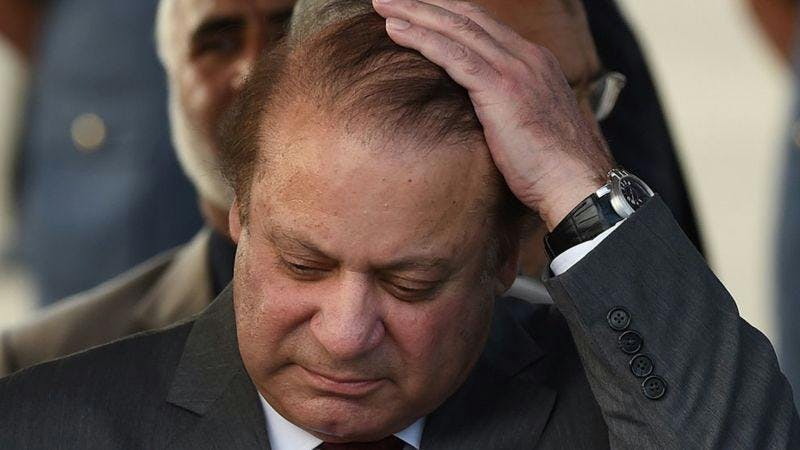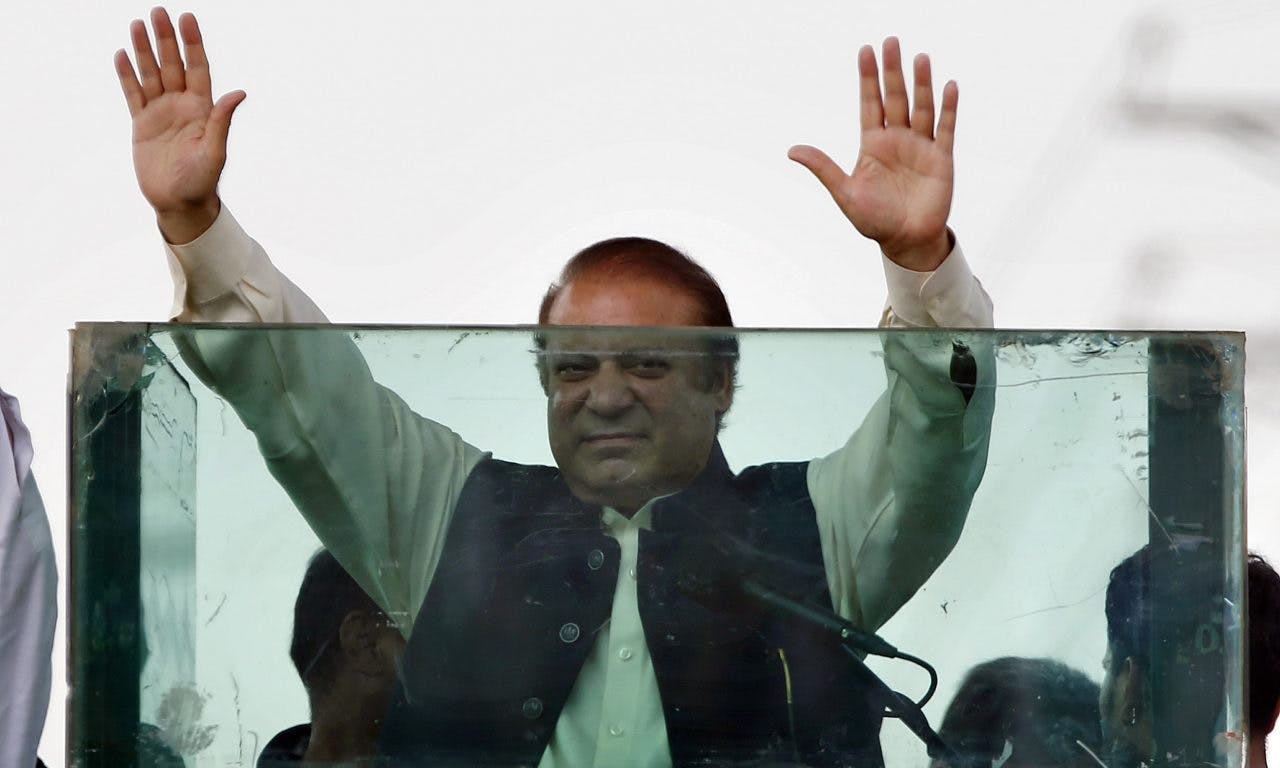Panama Game: JIT report may result in slow death through NAB trial

A legal view by Barrister Ameer Abbas Khan | Guest post
What outcome to expect from the Panama JIT report tomorrow? And what will Supreme Court do with the JIT report? This is the hot question everyone is asking today.
It appears that with the ‘Panama Game’ on carrying serious implications for Prime Minister Nawaz Sharif, the case could be sent for trial under the NAB laws which potentially are draconian in nature since a conviction in these sort of cases is possible on the basis of presumptions. Therefore, following JIT report a trial may pursue against PM Nawaz Sharif leading to the slow death of Sharif regime.
No doubt, the findings of JIT are going to be extremely crucial as they will form the basis for Supreme Court to determine the future of Nawaz Sharif. But one thing that can be inferred from Panama Judgment is that Supreme Court will examine the JIT findings in the light of section 9(a)(v) of the NAB Ordinance.
This indication provides us with the basis to form an opinion that until and unless JIT finds something solid in favour of Nawaz Sharif for the Supreme Court to dispel its already formed opinion that Nawaz Sharif and his family have not been open and frank in explaining their acquisition of four London flats, which arguably on its own be enough for the matter to be tried against Nawaz Sharif and his family under the NAB laws particularly under section 9(a)(v) of the NAB Ordinance.
Subscribe to our YouTube channel: Wali Zahid
7 July 2018 update: Nawaz Sharif sentenced to 10 years in prison with 8 million pounds fine; Maryam Nawaz gets 7 years in prison and 2 million pounds fine in Avenfield Reference. NAB orders confiscation of Avenfield apartments. Maryam Nawaz and husband Captain (R) Safdar are disqualified for 10 years each from contesting elections.
The NAB Ordinance stipulates that holder of public office or any other person is stated to have committed corruption or corrupt practice if he or any of his dependants or benamidars owns or possesses assets disproportionate to their known source of income, which they cannot reasonably account for or maintains a standard of living beyond that which is commensurate with his source of income.
These are not some ordinary flats but are properties worth billions of rupees and therefore explaining their source and providing money trail to dispel any notion of corruption would not be an easy task.
Due to the complex nature of financial transactions and that too quite old, it is highly unlikely that substantive evidence will come to light in the JIT investigation which either clearly shows in black and white that Nawaz Sharif indeed made a false declaration in his election nomination papers or in any other tax declaration warranting Supreme Court to exercise its jurisdiction under Article 184(3) of the Constitution and disqualify him on the basis of such a false declaration. Or, that the JIT would provide such information that would lead Supreme Court to conclude that prima facie Nawaz Sharif and his family are not found to have breached any of the NAB laws and thus the matter ends with no further action at all.
Thus, keeping in mind the provision of section 9(a)(v) of the NAB Ordinance and the failure on the part of Nawaz Sharif and his family to satisfactorily explain their position before the Supreme Court, the possibility cannot be ruled out that Nawaz Sharif and his family would still have failed to explain their position satisfactorily before the JIT as well. Thus, most likely they would be tried under the NAB Ordinance.
In this regard, the provision of section 14(c) of the NAB Ordinance is also very significant which primarily provides that in case the accused person fails to satisfactorily account for his assets, the Court shall presume, unless the contrary is proved, that the accused person is guilty of the offence of corruption and corrupt practices and his conviction therefore shall not be invalid for the reason that it is based solely on such presumption.
This means that under the NAB laws, the conviction of a person is possible on presumption and circumstantial evidence.
One thing is clear that no one could have imagined prior to the emergence of ‘Panama Scandal’ that purely on the basis of ‘Panama Leaks’, the firstly family of Pakistan would have to go through such a tighter scrutiny of law.
The fact that they are being investigated thoroughly, one can say with certainty that ‘Panama Case’ is still on and will not hither away just like a blow of wind and will actually do some damage to Nawaz Sharif since it is not the case engineered by some dictator or the opponent party but have arisen out of facts which are being analysed and examined by the independent judiciary of Pakistan.
A bit of background to the Panama JIT
‘Justice’ has many forms and shapes. Probably, this is the reason we find two contradictory views regarding one aspect of ‘Panama Judgment’ to do with the disqualification of Prime Minister Nawaz Sharif on the basis that he gave different accounts in relation to the ‘Four London Flats’ where only two out of the five Supreme Court judges deemed it a fit case for him to be disqualified.
As a student of law, I believe it was a very difficult case to legally justify the disqualification of Nawaz Sharif by Supreme Court in its jurisdiction under Article 184(3) of the Constitution of Pakistan. In my humble opinion, there could have been no better reasoning than the one rendered by the two Supreme Court judges in calling for the disqualification of Nawaz Sharif.
In essence, their conclusion was that since Nawaz Sharif gave conflicting statements about the ownership of ‘Four London Flats’, therefore he has not been ‘honest’ to the nation, the representatives of the nation in the National Assembly and to the Supreme Court, and thus has become disqualified from being a member of Parliament in terms of Article 62(1)(f) of the Constitution of Pakistan 1973 and section 99(1)(f) of the Representation of the People Act 1976.
The majority did not agree with this approach primarily on the basis that the Supreme Court would be stretching its jurisdiction under Article 184(3) of the Constitution of Pakistan as well as it would be a wrong precedent.
However, reading the whole judgment, it becomes clear that, in dispensing justice, both groups of judges have different approaches in their mind with majority clinching on to the idea of ‘Legal Justice’ where everything is done according to the due process of law with one step leading to another and any missing link would render the whole process collapse. That is why we see time and again some very high profile cases getting thrown out of courts on a very fine piece of legal argument.
On the other hand, the minority judges appear to have ‘Social Justice’ to their heart where the end result portraying justice is more important than the means to end. That is why some leading jurists, including 18th century British eminent Chancellor Lord Mansfield used to first determine what was right and then coat such decision with legal reasoning.
In ‘Panama Case’, this approach becomes even more significant when almost every citizen in Pakistan would perceive to admit that Nawaz Sharif is not upright and has misused his office and acquired those flats through plundered money.
It is not that the minority judges decided in favour of disqualification to satisfy the populous demand and did not appreciate the complexity of disqualifying Nawaz Sharif through their judgment, as they acknowledged that Article 62 of the Constitution of Pakistan 1973 was inserted by a military dictator but is still part of our laws.
Though, it may not be a desirable thing for courts to get involved in matters similar to ‘Panama Case’, it is imperative that as long as these provisions are in place they can be exercised to drive the powerful out of their offices when they are implicated in serious scandals of corruption or immoral conduct.
With the only distinction of above aspect about the disqualification of Nawaz Sharif, almost the whole bench of Supreme Court was not satisfied with the explanation provided by Nawaz Sharif and his family in acquiring those London flats, and all the judges were in conformity with each other for a detailed and thorough enquiry as to when and how those flats were acquired so as to determine whether or not the provision of section 9(a)(v) of the National Accountability Bureau (NAB) Ordinance 1999 is attracted.
As required under the NAB Ordinance, the NAB chairman did not initiate the enquiry into the ‘Panama Scandal’ when it came with 400 Pakistanis names in it in April 2016, highlighting that even in this time and age the powerful ones are still outside the ambit of law. This prompted the Supreme Court to get the matter looked into under its own supervision.
Accordingly, a Joint Investigation Team (JIT) was constituted to investigate and collect evidence in relation to Nawaz Sharif or any of his dependents or benamidars owning, possessing or acquiring assets or interest therein disproportionate to his known means of income, which actually are the attributes mentioned in section 9(a)(v) of the NAB Ordinance.
The 12 questions
It is pertinent to note that in constituting the JIT, the Supreme Court had the following 12 questions in mind:
- How did Gulf Steel Mill come into being?
- What happened to its liabilities?
- Where did its sale proceeds end up?
- How did they reach Jeddah, Qatar and UK?
- Whether Respondents No 7 (Hussain Nawaz Sharif) and 8 (Hassan Nawaz Sharif) in view of their tender ages had the means in the early nineties to possess and purchase the flats?
- Whether sudden appearance of the letters of Hamaad Bin Jassim Bin Jaber Al-Thani is a myth or a reality?
- How bearer shares crystallized into the flats?
- Who, in fact, is the real and beneficial owner of M/S Nielsen Enterprises Limited and Nescoll Limited?
- How did Hill Metal Establishment come into existence?
- Where did the money for Flagship Investment Limited and other companies set up/ taken over by Respondent No 8 come from?
- Where did the Working Capital for such companies come from?
- Where do the huge sums running into millions gifted by Respondent No 7 to Respondent No 1 (Mian Muhammad Nawaz Sharif) drop in from?
These very specific questions absolutely goes deep down to the financial position of Nawaz Sharif and his family and they in turn would determine whether or not those ‘London Flats’ were acquired through legitimate means. To ensure that the matter is looked into without any of executive interference, the Supreme Court made the JIT to update Supreme Court fortnightly about the progress of its investigation.
Such a list of questions together with Supreme Court keeping JIT immune from executive interference and directing the JIT to also consider the evidence already collected by NAB and FIA in the past shows a resolve on the part of Supreme Court to determine the alleged plundering of wealth by Nawaz Sharif particularly the ‘Four London Flats’ strictly in accordance with law.
The manner in which JIT has actually conducted its investigation it appears that the matter has been thoroughly investigated and Nawaz Sharif may not come out of it with clean hands purely on the basis that he is the Prime Minister of Pakistan and is above the law.
An Abdalian and Aitchisonian, Barrister Ameer Abbas Ali Khan, is a Solicitor-Advocate (UK), Advocate High Court. He has LLB (Hons) UK, LLM (LSE), Bar-at-Law from Lincoln Inn, and lives in London and Lahore. His father has been an MP in Pakistan over several decades.

Wali Zahid
Wali Zahid is a longtime China watcher and a Pakistan futurist. An award-winning journalist, he writes on issues of significance to Pakistan and CPEC & BRI.
Related posts

